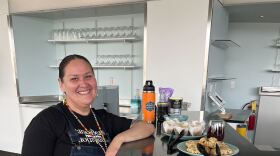Of the many climate crises we face, soil erosion isn’t usually on the top of people’s lists. But it should be. Without topsoil, we can’t grow food. Without food, civilizations collapse.
The U.S. Department of Agriculture estimates that our agricultural soil erodes at an average rate of almost 5 tons of topsoil per acre, per year. In contrast, soil regenerates at less than one-tenth of that rate. Farming practices contribute to the loss, as does global warming. But Dr. Jo Handelsman says we can fix it.
Handelsman is the director of the Wisconsin Institute for Discovery at UW Madison and a research professor in the Department of Plant Pathology. She says there are a number of farming methods, including something called intercropping, that are less destructive to the topsoil.
"There are some wonderful experiments that show that if you simply take 10% of the corn out of production and replace it with deep-rooted prairie plants, that is sufficient to reduce erosion by 95%," she says. Corn yields increase as well, despite planting less of it.
READ: UN Report Links Soil Degradation To Climate Change
But to save our agricultural soils, we have to be willing to change the way we farm. Handelsman says there are already large tracts of land in the Midwest where the subsoil — the mineral layer that isn't fit for growing crops — is peeking through. She says if erosion continues at its current rate, we're going to see substantial acreages that have lost all of their topsoil by as soon as 2025. And if we do nothing, Handelsman thinks we'll be in extremely severe soil loss conditions by 2050.
But the good news: we can fix it. Soil can be regenerated.
"If we stop eroding it and start building it, we can be in a much better place in terms of the condition of our soil in a very short amount of time," she explains.
Handelsman will deliver a talk on soil preservation at the Milwaukee Public Museum Thursday evening.






